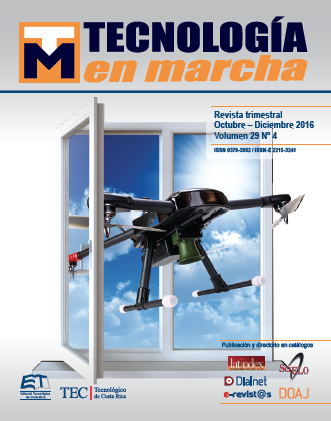Actual situation of construction materials management in Costa Rica
Main Article Content
Abstract
The construction industry is considered a pillar in the economy of nations. It provides housing, buildings and infrastructure for a growing population and continued urbanization, especially in developing countries. However, this sector is known as a major consumer of natural resources producing a significant amount of construction and demolition waste.
The data, on the situation of construction waste generation is scarce in Costa Rica. Therefore, the aim of the study is to develop a baseline on the quantities and composition of the waste generated during the construction process, as well as the motivators and barriers to achieve a more sustainable activity.
In order to achieve the objective, a survey was done by means of a questionnaire and interviews including construction site visits. According to the results, construction waste is composed of wood, soil, rest of piping materials, corrugated sheet, metal wires, packaging materials (paper, plastic, cardboard), cement, concrete, cement blocks, paints and debris. The quantities, either by volume or weight are unknown due to the lack of records kept by the companies.
An indicator related to construction waste generation was determined as 100 kg/m2. This value is high compared to the ones reported in literature for developed countries which could be explained as due to the lack of knowledge on technologies and information on the environmental impact of their activities by the construction companies, the absence of enforcement procedures, and market incentives for a more sustainable activity.
Article Details
Los autores conservan los derechos de autor y ceden a la revista el derecho de la primera publicación y pueda editarlo, reproducirlo, distribuirlo, exhibirlo y comunicarlo en el país y en el extranjero mediante medios impresos y electrónicos. Asimismo, asumen el compromiso sobre cualquier litigio o reclamación relacionada con derechos de propiedad intelectual, exonerando de responsabilidad a la Editorial Tecnológica de Costa Rica. Además, se establece que los autores pueden realizar otros acuerdos contractuales independientes y adicionales para la distribución no exclusiva de la versión del artículo publicado en esta revista (p. ej., incluirlo en un repositorio institucional o publicarlo en un libro) siempre que indiquen claramente que el trabajo se publicó por primera vez en esta revista.

